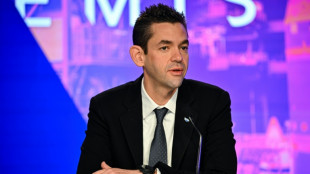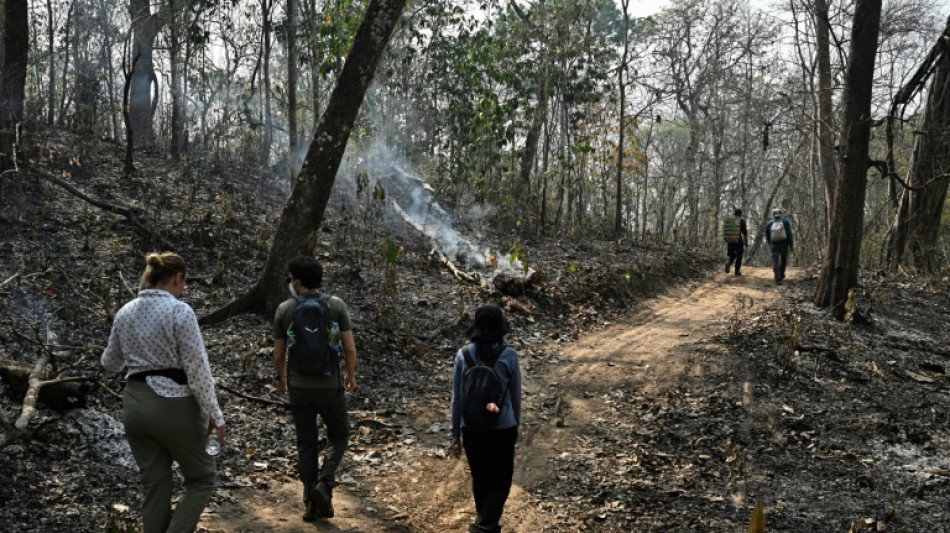
-
 'Sinners' wins top prize at Screen Actors Guild awards
'Sinners' wins top prize at Screen Actors Guild awards
-
New rules, same old suspects as F1 revs up for 2026 season

-
 World Cup tickets: Huge demand and sky-high prices
World Cup tickets: Huge demand and sky-high prices
-
List of key Actor Award winners

-
 Trump hunkers down after Iran strikes
Trump hunkers down after Iran strikes
-
China's leaders gather for key strategy session as challenges grow

-
 UK toughens asylum rules to discourage migration
UK toughens asylum rules to discourage migration
-
Israel hits Lebanon after Hezbollah fire, expanding Iran war

-
 CBS in turmoil as US media feels pressure under Trump
CBS in turmoil as US media feels pressure under Trump
-
Messi bags double as Miami battle back to down Orlando

-
 Greenland is 'open for business' -- kind of, says business leader
Greenland is 'open for business' -- kind of, says business leader
-
Canada's Carney to mend rift, boost trade as he meets India's Modi

-
 Crude soars, stocks drop after US strikes on Iran
Crude soars, stocks drop after US strikes on Iran
-
Iran war spreads across region as US, Israel suffer losses

-
 Miriam Margolyes tackles aging in Oscar-nominated short
Miriam Margolyes tackles aging in Oscar-nominated short
-
Recognition, not competition, for Oscar-nominated foreign filmmakers

-
 Israel, Hezbollah trade fire: latest developments in Iran war
Israel, Hezbollah trade fire: latest developments in Iran war
-
Israel strikes Tehran: latest developments in Iran war

-
 Trump vows to avenge first US deaths as Iran war intensifies
Trump vows to avenge first US deaths as Iran war intensifies
-
Lowry collapses late again, Echavarria snatches victory in Cognizant Classic

-
 Aubameyang strikes twice as Marseille edge Lyon in Ligue 1
Aubameyang strikes twice as Marseille edge Lyon in Ligue 1
-
Infantino says players who cover mouths when speaking could be sent off

-
 Bolsonaro son rallies the right as thousands protest Brazil government
Bolsonaro son rallies the right as thousands protest Brazil government
-
Juve stay in Champions League hunt with last-gasp Roma draw

-
 Maersk suspends vessel transit through Strait of Hormuz
Maersk suspends vessel transit through Strait of Hormuz
-
France, Germany, UK ready to take 'defensive action' against Iran

-
 Knicks halt Spurs' 11-game NBA winning streak
Knicks halt Spurs' 11-game NBA winning streak
-
EU warns against long war, urges 'credible transition' in Iran

-
 Bored of peace? Trump keeps choosing war
Bored of peace? Trump keeps choosing war
-
Arteta embraces Arsenal's 'Set-Piece FC' label after corners sink Chelsea

-
 Sevilla rescue derby draw to deal Betis top four setback
Sevilla rescue derby draw to deal Betis top four setback
-
India need 'special effort' to beat England in semi-final: Gambhir

-
 'A terrible day,' says Israel community shaken by deadly Iranian strike
'A terrible day,' says Israel community shaken by deadly Iranian strike
-
Arsenal corner Chelsea into submission, Man Utd climb to third

-
 Arsenal win set-piece battle to sink Chelsea in title boost
Arsenal win set-piece battle to sink Chelsea in title boost
-
What future for Iranian leadership after Khamenei's death?

-
 'Scream 7' makes a killing at N. America box office
'Scream 7' makes a killing at N. America box office
-
Thousands stranded as Iran conflict shuts Mideast hubs
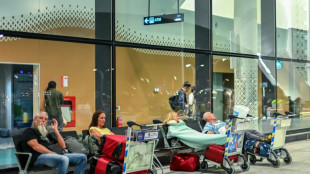
-
 Samson's 97 puts India into T20 World Cup semi-final against England
Samson's 97 puts India into T20 World Cup semi-final against England
-
Latest developments as Iran retaliates to US-Israel strikes that killed Khamenei

-
 Spurs have 'big problems' says Tudor as relegation risk persists
Spurs have 'big problems' says Tudor as relegation risk persists
-
Dortmund captain Can out for season with ACL tear

-
 Leweling doubles up as Stuttgart sink sorry Wolfsburg
Leweling doubles up as Stuttgart sink sorry Wolfsburg
-
Man Utd climb to third, Fulham sink sorry Spurs

-
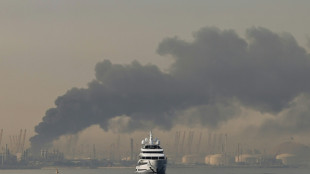 Iran strikes send VIP Dubai influencers 'back to reality'
Iran strikes send VIP Dubai influencers 'back to reality'
-
Briton Brennan bursts to Kuurne-Bruxelles-Kuurne triumph

-
 Activists pressure Milan Fashion Week to go fully fur-free
Activists pressure Milan Fashion Week to go fully fur-free
-
Blasts in Kabul as Afghan govt says responding to Pakistan attacks
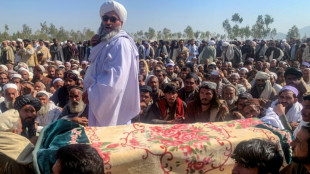
-
 Iranians grieve, celebrate, worry after Khamenei's killing
Iranians grieve, celebrate, worry after Khamenei's killing
-
Latest developments as Iran lashes out after US-Israel strikes kill Khamenei
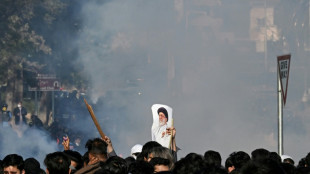

'It's gone': conservation science in Thailand's burning forest
Scientist Inna Birchenko began to cry as she described the smouldering protected forest in Thailand where she was collecting samples from local trees shrouded in wildfire smoke.
"This beautiful, diverse community of trees and animals is being destroyed as you see it, as you watch it," she said.
Birchenko, a geneticist at Royal Botanic Gardens, Kew, was collecting seeds and leaves in Umphang Wildlife Sanctuary with colleagues from Britain and Thailand.
They will study how temperature and moisture affect germination and whether genetics dictate those responses.
That may one day help ensure that reforestation is done with trees that can withstand the hotter temperatures and drier conditions caused by climate change.
But in Umphang, a remote region in Thailand's northwest, the scientists confronted the toll that human activity and climate change are already having on forests that are supposed to be pristine and protected.
Birchenko and her colleagues hiked kilometre after kilometre through burned or still-smouldering forest, each footstep stirring up columns of black and grey ash.
They passed thick fallen trees that were smoking or even being licked by dancing flames, and traversed stretches of farmland littered with corn husks, all within the sanctuary's boundaries.
The wildlife for which the sanctuary is famous -- hornbills, deer, elephants and even tigers -- was nowhere to be seen.
Instead, there were traces of the fire's effect: a palm-sized cicada, its front neon yellow, its back end charred black; and the nest of a wild fowl, harbouring five scorched eggs.
"My heart is broken," said Nattanit Yiamthaisong, a PhD student at Chiang Mai University's Forest Restoration and Research Unit (FORRU) who is working with Birchenko and her Kew colleague Jan Sala.
"I expected a wildlife sanctuary or national park is a protected area. I'm not expecting a lot of agricultural land like this, a lot of fire along the way."
- Global threat of wildfires -
The burning in Umphang Wildlife Sanctuary is hardly an outlier.
Wildfires are common in Thailand during the country's spring burning season, when farmers set fields alight to prepare for new crops.
Some communities have permission to live and farm plots inside protected areas because of their long-standing presence on the land.
Traditionally, burning has helped farmers enrich soil, and fire can be a natural part of a forest's ecosystem. Some seeds rely on fire to germinate.
But agricultural burning can quickly spread to adjacent forest -- intentionally or by accident.
The risks are heightened by the drier conditions of climate change and growing economic pressure on farmers, who are keen to plant more frequently and across larger areas.
Experts warn that forests subjected to repeated, high-intensity fires have no chance to regenerate naturally, and may never recover.
Fire data based on satellite images compiled by US space agency NASA shows hotspots and active fires burning across many protected areas in Thailand over recent weeks.
Around tourist hotspot Chiang Mai, firefighting helicopters drop water on local wildfires, at a cost of thousands of dollars per mission.
But remote Umphang is far from the public eye.
Park rangers protect the area, but they are frequently underpaid, poorly resourced and overstretched, local environmentalists say.
It's a long-standing problem in Thailand, whose Department of National Parks has sometimes closed protected areas in a bid to prevent fires from spreading. The department did not respond to AFP requests for comment.
And the challenge is hardly unique to Thailand. Devastating blazes have ravaged wealthy California, Japan and South Korea in recent months.
- Deforestation at 'very high speed' -
Still, it was a sobering sight for Sala, a seed germination expert at Kew.
"The pristine rainforest that we were expecting to see, it's actually not here any more, it's gone," he said.
"It really shows the importance of conservation, of preserving biodiversity. Everything is being deforested at a very, very high speed."
Sala and Birchenko work with Kew's Millennium Seed Bank, which holds nearly 2.5 million seeds from over 40,000 wild plant species.
They want to "unlock" knowledge from the seed bank and help partners like FORRU, which has spent decades working out how to rebuild healthy forests in Thailand.
The partnership will map the genetic structure and diversity of three tree species, predict their resilience to climate change, and eventually delineate seed zones in Thailand.
"We hope that some of the population will be more resilient to climate change. And then... we can make better use of which populations to use for reforestation," said Sala.
Back in Britain, seeds will be germinated at varying temperatures and moisture levels to find their upper limits.
Genetic analysis will show how populations are related and which mutations may produce more climate-resilient trees.
But first the team needs samples.
The scientists are focusing on three species: albizia odoratissima, phyllanthus emblica -- also known as Indian gooseberry -- and sapindus rarak, a kind of soapberry tree.
The three grow across different climates in Thailand, are not endangered and have traditionally been used by local communities, who can help locate them.
Still, much of the search unfolds something like an Easter egg hunt, with the team traipsing through forest, scanning their surroundings for the leaf patterns of their target trees.
- 'Capsule of genetic diversity' -
"Ma Sak?" shouts Sala, using the local name for sapindus rarak, whose fruits were once used as a natural detergent.
It's up to FORRU nursery and field technician Thongyod Chiangkanta, a former park ranger and plant identification expert, to confirm.
Ideally seeds are collected from fruit on the tree, but the branches may be dozens of feet in the air.
A low-tech solution is at hand -- a red string with a weight attached to one end is hurled towards the canopy and looped over some branches.
Shaking it sends down a hail of fruit, along with leaves for Birchenko to analyse. Separate leaf and branch samples are carefully pressed to join the more than seven million specimens at Kew's herbarium.
The teams will collect thousands of seeds in all, carefully cutting open samples at each stop to ensure they are not rotten or infested.
They take no more than a quarter of what is available, leaving enough for natural growth from the "soil seed bank" that surrounds each tree.
Each successful collection is a relief after months of preparation, but the harsh reality of the forest's precarious future hangs over the team.
"It's this excitement of finding the trees... and at the same time really sad because you know that five metres (16 feet) next to the tree there's a wildfire, there's degraded area, and I assume that in the next years these trees are going to be gone," said Sala.
The team is collecting at seven locations across Thailand, gathering specimens that are "a capsule of genetic diversity that we have preserved for the future", said Birchenko.
"We are doing something, but we are doing so little and potentially also so late."
Y.Nakamura--AMWN



